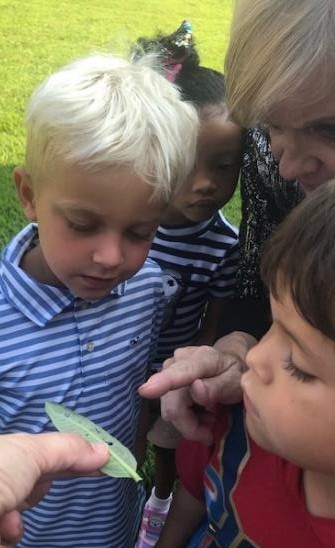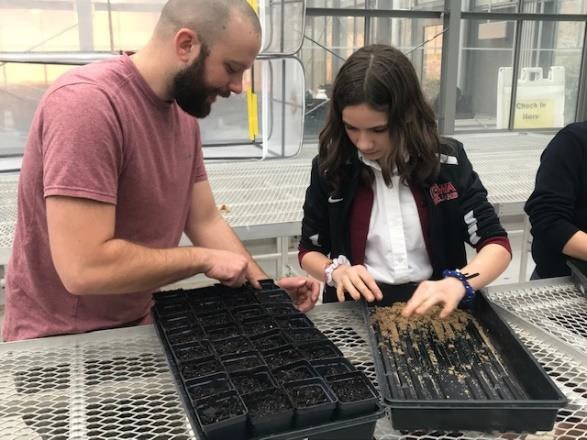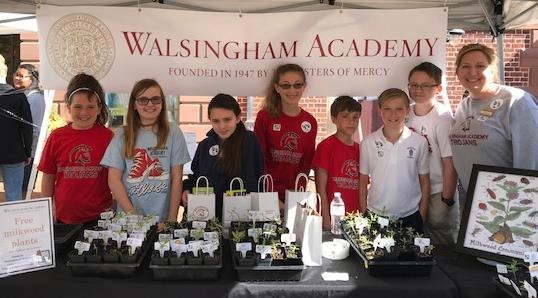By Kim Ward, Walsingham Academy Lower School Science Coordinator
Williamsburg youth are evoking change in their community and impacting the sustainability of life! The environmental stewardship program at Walsingham Academy builds a deep appreciation for God’s creation and empowers its youth to work toward solving the problem of habitat destruction. The school is creating active citizen-scientists who are learning to tackle problems on a more national scale.
I am fortunate to serve as the science coordinator for students in pre-kindergarten through 7th grade at this Sisters of Mercy school. The students at Walsingham Academy begin their appreciation of God’s creation in pre-K; by the time they complete the program in middle school, they are environmental advocates.

Our youngest learners start their environmental journey in the school’s learning garden, caring for native plant species and monitoring milkweed plants. During the summer months, our garden is full of insects that help pollinate the native perennials originally planted during an Earth Day event several years ago. Their return to school in August coincides with the journey of our favorite migrating species—the Monarch butterfly—as it travels through Virginia on its way to Mexico.
The children take pride in finding the hungry caterpillars on our milkweed plants in the garden and rearing them to their butterfly stage, monitoring them indoors where they are safely protected from garden predators. The release of the newly emerged Monarchs is a thrill to every child in the school.
As the students explore the needs of the Monarch, they quickly understand that without milkweed, the insect’s life cycle is negatively impacted. The children wonder why there wasn’t enough milkweed available to the traveling butterfly only to learn that habitat destruction from Virginia to Mexico has devastated the plant.
My middle school students investigated this problem and developed a response, one that is changing the landscape of their community. We first paired with a milkweed expert at the College of William & Mary, Dr. Joshua Puzey. Together he and a colleague, Dr. Harmony Dalgleish, helped the students of Walsingham Academy put their plan into action. The children’s goal: educate others about the importance of milkweed and supply the community with the vital plant to help save the Monarchs. Each winter, Walsingham students learn new germination strategies from the professors at William & Mary and work diligently to plant hundreds of milkweed seeds.

The plan is working! Last spring, students distributed nearly 300 milkweed plants to residents of James City County, eagerly sharing the Monarch’s story and explaining the need for milkweed in local gardens. This year, our goal is to distribute 500 plants to the community. Once we complete construction of our school’s greenhouse this year, we will be able to grow even more milkweed plants.

With a place to lay their eggs, the Monarch population will have a chance to recover from the devastation of habitat loss. My students are a part of that change. From the youngest children through the middle school years, Walsingham students show compassion for God’s creation and are empowered to address problems like this in their environment. Through their service, Williamsburg residents will enjoy the benefits of raising milkweed in their own gardens and understand the plant’s role in the life cycle of one of God’s smallest, most beautiful creatures.
Making change in your community can start in your own backyard, by planting native species on your property. Native plants are tolerant to the climate fluctuations in a particular area, and they contribute food and shelter to insects that are plant specific, thereby promoting a healthier ecosystem. I would also encourage everyone to reach out to a local elementary school and volunteer to help in the school’s garden. Planting a garden is the easy step; maintaining the learning space takes commitment and brings with it additional challenges. Teachers can always use the extra help, so what are you waiting for?
Get growing!
To deepen your engagement with the Sisters of Mercy’s Critical Concern of Earth during the season of Lent, please explore an examination of conscience for consumers, a faith leader’s guide to the impacts of climate change on regions throughout the United States, and a study & action guide to Laudato Si.